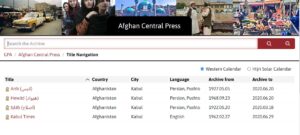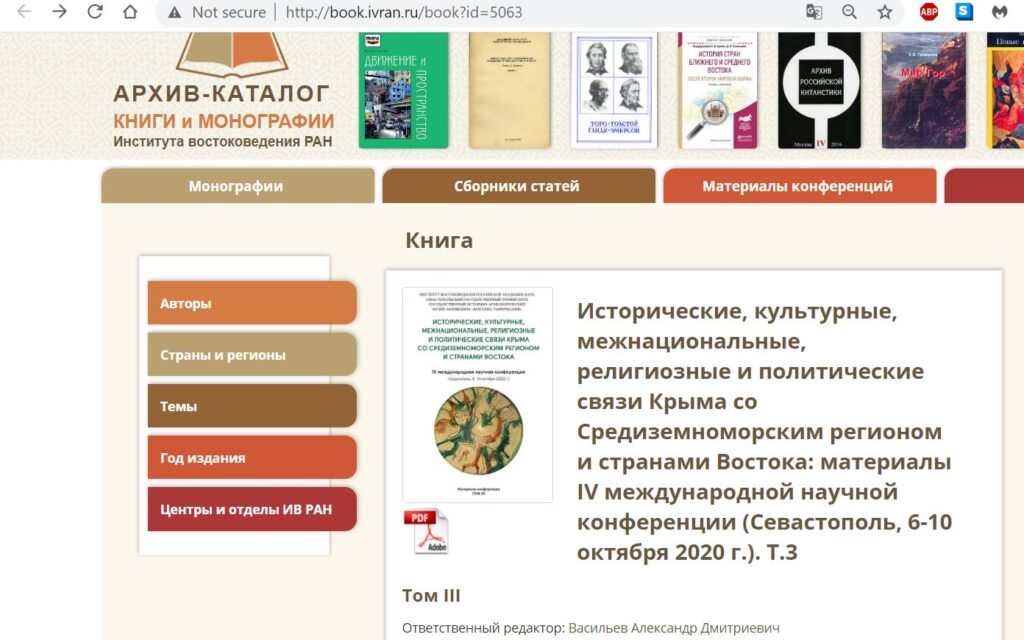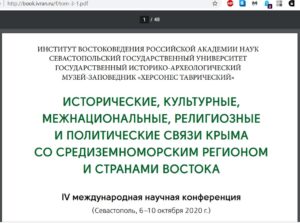Tag: Central Asia
Conference at UC Berkeley: Ruling Together Consultation and Collaboration in the Political Regimes of Premodern Eurasia
Ruling Together: Consultation and Collaboration in the Political Regimes of Premodern Eurasia
February 16, 2024
Maude Fife Room, 315 Wheeler Hall, UC Berkeley
Organized by Tang Center for Silk Road Studies
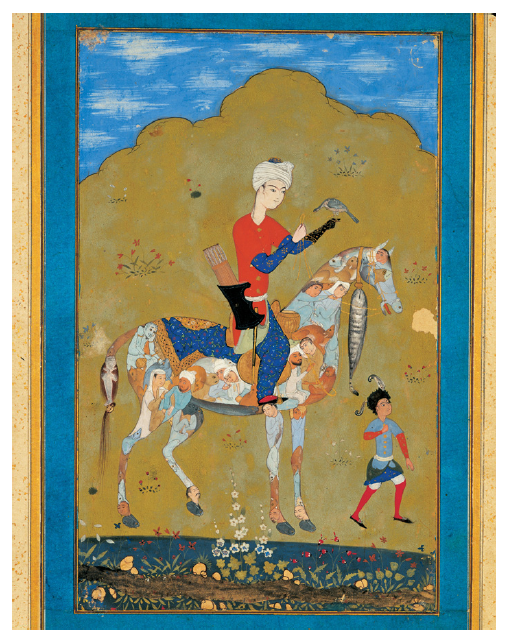
The conference focuses on the medieval and early modern periods (1000-1700 CE) as a crucial era for cross-cultural contact, challenging the lesser emphasis this period has received within “Silk Road” scholarship. It argues that viewing Eurasia merely as a space of intermittent object and idea exchange through trade or diplomacy depoliticizes cultural and goods spread, which is inadequate for understanding the political dynamics of these centuries dominated by the Mongol Empire and its successors. Emphasizing the role of political institutions in transregional history, the conference aims to integrate the study of cross-cultural contact with political history, highlighting Central Asia’s significance in the global political history of the medieval and early modern periods.
8:30 Tea and Coffee
9:00 Welcome Remarks
Panel 1
Who Should Rule? Institutions of Sovereignty and Succession
9:15 Christopher Atwood, University of Pennsylvania
The First Interregnum: Imperial Stake Holders in a (Temporarily) Khan-less World
9:45 Michael Bechtel, Nazarbaev University
Mongol Empire 1229-46: Frameworks of Rule and Redistribution (Related article is here)
10:15 Jonathan Brack, Northwestern University
Chinggisid Family Feuds, Islamization, and the Religious Sphere in Mongol-ruled Iran
10:45 Evrim Binbaş, University of Bonn
The Theater of Constitutional Ideas: The First Timurid Civil War and Shahrukh’s Ascension to Timur’s Throne
11:15 Discussion
11:45 Lunch break
Panel 2
How to Rule? Transcontinental Institutions
1:30 Carol Fan, University of Bonn
Revenue sharing networks within the Mongol Empire and transregional contacts
across Eurasia in the 13th and 15th centuries
2:00 Paehwan Seol, Chonnam National University
The Jarghu: Mobile Courts and Justice Networks of the Mongols throughout East-
West Asia during the 13th to 14th Centuries
2:30 Natalia Królikowska, University of Warsaw
Numerous Nogay peoples, the Circassians and innumerable Tatars’ influence on the decision-making process in the Crimean khanate.
3:00 Discussion
3:30 Tea and Coffee
Panel 3
What is Ruling? Conceptualizing State and Empire
3:45 David Sneath, University of Cambridge
The Lords’ Administration: Mongolian aristocratic governance and the state as social
relation
4:15 Munkh-Erdene Lhamsüren, National University of Mongolia
The Chinggisid Sovereignty: Myth, Archetype, and Transformation (see similar article here)
4:45 Kaveh Hemmat, Benedictine University
Rule of Law in Islamicate Civic Lore Concerning the Mongol Empire and China
5:15 Discussion
Primary Sources: British and US documents on Afghanistan, Central Asia, and Persia
Afghanistan and the U.S., 1945-1963: Records of the U.S. State Department Classified Files
Declassified U.S. State Department files documenting U.S. and Afghan relations during the height of the Cold War and U.S. policies toward Afghanistan. The resource includes 3 subcollections:
- Records of the Department of State relating to Internal Affairs: Afghanistan, 1945-1949
- Records of the Department of State relating to Internal Affairs: Afghanistan, 1960-1963
- Records of the Department of State relating to Political Relations: U.S. and Afghanistan, 1930-1959
Afghanistan in 1919: The Third Anglo-Afghan War
The Third Anglo-Afghan War began 6 May 1919 and ended with an armistice on 8 August 1919 resulted in Afghanistan gaining indpendence from British influence. This collection of British India Office documents includes confidential correspondence, memoranda, orders, reports and other materials that provide a broad spectrum of information on military policy and administration, including the organization, operations and equipment of the British army during the war.
Central Asia, Persia and Afghanistan, 1834-1922: From Silk Road to Soviet Rule
This collection of British Foreign Office files explores the history of Persia (Iran), Central Asia and Afghanistan from the decline of the Silk Road in the first half of the nineteenth century to the establishment of Soviet rule over parts of the region in the early 1920s. It encompasses the era of “The Great Game” – a political and diplomatic confrontation between the Russian and British Empires for influence, territory and trade across a vast region, from the Black Sea in the west to the Pamir Mountains in the east.
Comprised of correspondence, intelligence reports, agents’ diaries, minutes, maps, newspaper excerpts and other materials from the FO 65, FO 106, FO 371 and FO 539 series, this resource forms one of the greatest existing sets of historical documents relating to this region, offering insights not only into the impact of Great Power politics on the region, but also the region’s peoples, cultures and societies.
Sovetskii Ekran (Soviet Film) Digital Archive at UC Berkeley Library
The Library has purchased the Digital Archive of a Soviet film magazine: Sovetskii Ekran. The archive provides access to the full-text of journal issues that were published from 1925-1998.
Below is the screenshot of the landing page of the Sovietskii Ekran.

At the time of writing this blog, the digitization of issues was completed through 1970 and the additional digitization was in progress.
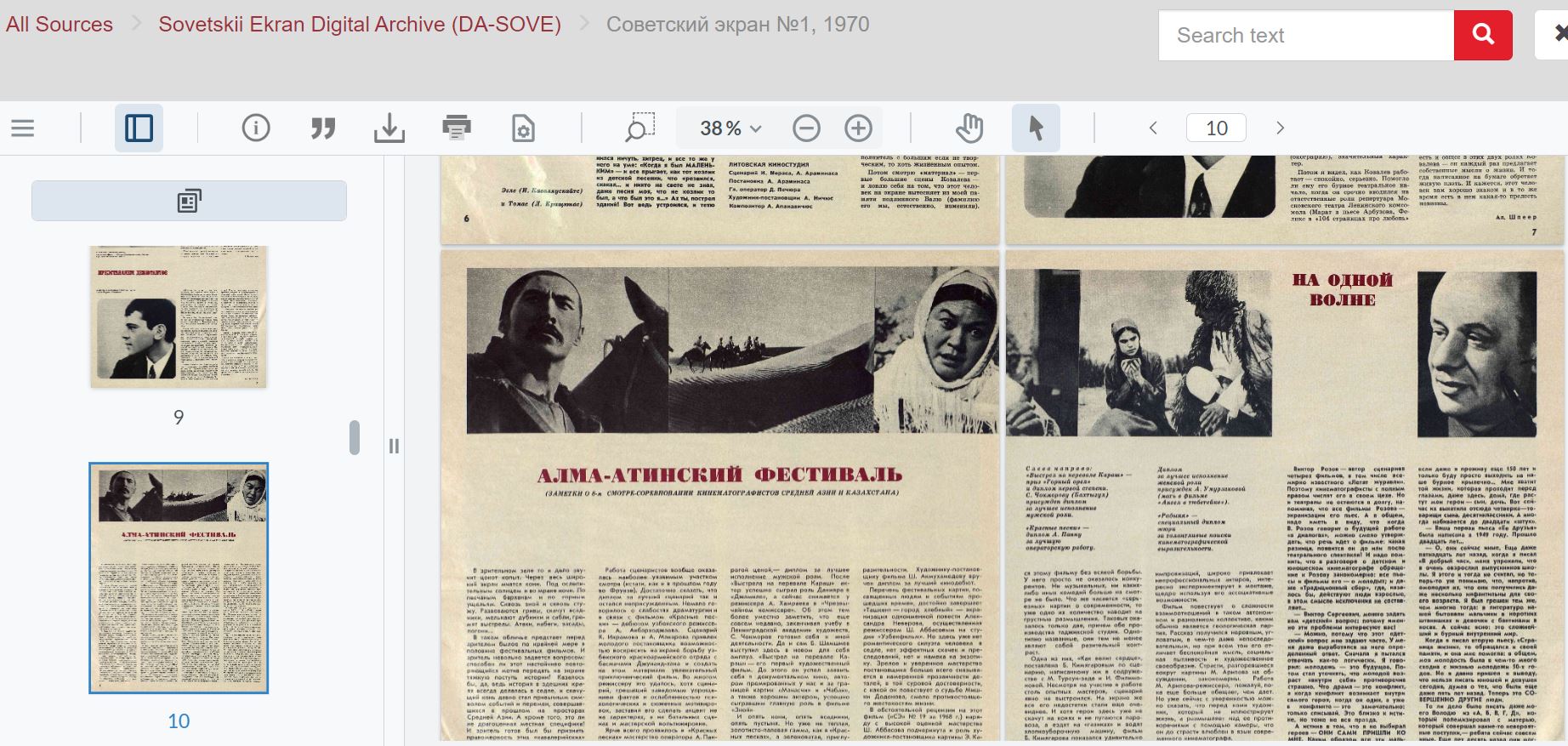
About the journal:
Soviet Screen was a magazine in the USSR that ran from 1925 to 1998 (with a break from 1941 to 1957). It talked about movies, both from the Soviet Union and other countries, cinema history, and had articles critiquing films. They also had reader polls each year to pick the best film, actor, actress, film for children, and music film.
The magazine had different names over the years, like Screen Film Gazeta in 1925, Cinema and Life in 1929–1930, Proletarian Cinema from 1931–1939, and Screen from 1991–1997. Before 1992, it was connected to the Union of Cinematographers of the USSR State Committee for Cinematography and the USSR.
In 1984, they printed 1.9 million copies. In 1991, the editor was Victor Dyomin, and the magazine was published under the title: Screen. It started coming out less often, monthly instead of more frequently. It kept going as Screen Magazine until 1997, then for a few months in 1997-1998, it went back to its old name-Soviet Screen. But it couldn’t survive the financial troubles in 1998 and had to stop publishing (Source: Wikip.).
Happy International Women’s Day and Conference Dedicated to International Women’s Day!
In many of the world, we enthusiastically celebrate International Women’s Day. We were not aware then of Valentine’s Day and scamming of flower prices then. While the questions surrounding diverse values, gender identities, and contemporary politics are complicated, it is important to note that for many in the world, the basic human rights that we take for granted in the United States are beyond reach. I have been asked today to post a courtesy conference that is not affiliated with our library in which I will participate as a member of the organizing committee in my private capacity. The conference is dedicated to women of contemporary Afghanistan.
The conference will occur tomorrow, March 9th, from 9 am PST through 12 noon. The website for the conference is Afghan Women Speak: Voices from within and beyond. The conference is FREE and OPEN to all with prior registration.
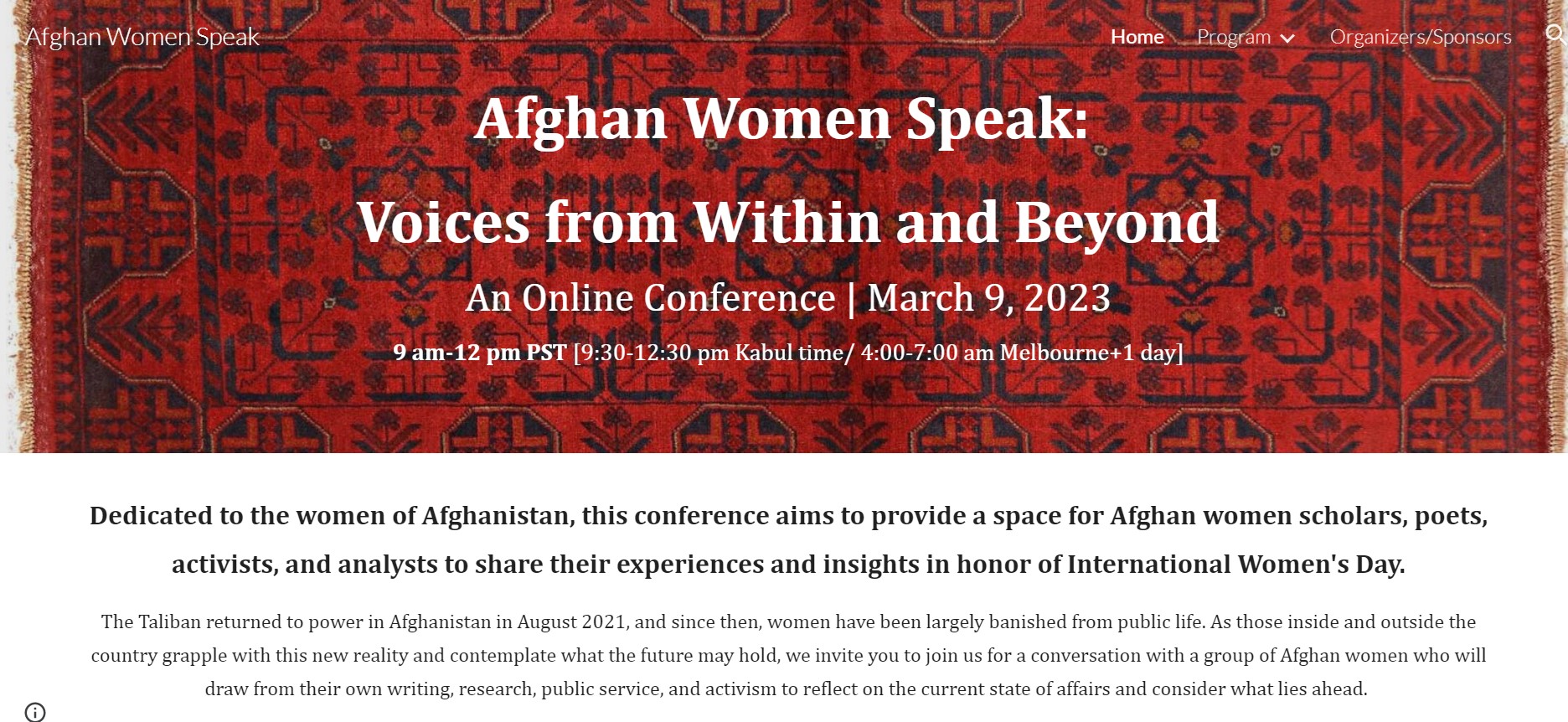
Trial of Afghan Central Press at UC Berkeley Library
We have set up a thirty-day trial of Afghan Central Press at UC Berkeley Library beginning November 15, 2022.
The vendor description is as follows,
“The Afghan Central Press collection brings together four national, Kabul-based publications of Afghanistan whose long runs and prominence provide a concentrated vantage point for understanding developments in Afghanistan for much of the twentieth century. The English-language Kabul Times is presented alongside Pushto publications Anīs (انیس, Companion), Hewād (هیواد, Homeland), and Iṣlāḥ (اصلاح, Reform).”
The collection provides full-text access to over fifty thousand individual issues in Dari (Persian), Pushto, and English languages.
The Afghan Central Press collection is hosted on Eastview’s Global Press Archive platform.
[Webinar-UC Berkeley Library] Afghanistan: One Year Later!
We invite you to attend a ninety-minute Afghanistan-related webinar sponsored by multiple Area and International Studies-related centers and Institutes (CMES, ISAS, ISEEES, IEAS) and the library at UC Berkeley.
Title of the webinar: Afghanistan: One Year Later!
Date: August 16, 2022
Day: Tuesday
Time:
11:30 am to 1 pm PDT
1:30 pm to 3 pm CDT
2:30 pm to 4 pm EDT
——————————
7:30 pm to 9 pm UK time
11:00 to midnight Kabul time
————————-
Registration
The webinar is free and open to all with prior registration: http://ucberk.li/3r3
——————–
Speakers
- PROFESSOR CARTER MALKASIAN, PH.D., Chair, Defense Analysis Department, Naval Postgraduate School
- PROFESSOR SHER JAN AHMADZAI, Director of the Center for Afghanistan Studies, University of Nebraska at Omaha
- PROFESSOR DIPALI MUKHOPADHYAY, PH.D., Hubert H. Humphrey School of Public Affairs, University of Minnesota
- PROFESSOR SHAH MAHMOUD HANIFI, PH.D., Department of History, James Madison University
- Moderator: Dr. Liladhar R. Pendse, Librarian, UC Berkeley
A special note of gratitude to the Library’s Communications Team, Professors Asad Q. Ahmed of Middle Eastern Languages & Cultures, Wali Ahmadi of Middle Eastern Languages & Cultures, and Munis Faruqui of Department of South and Southeast Asian Studies, Central Asia Working Group at the IEAS.
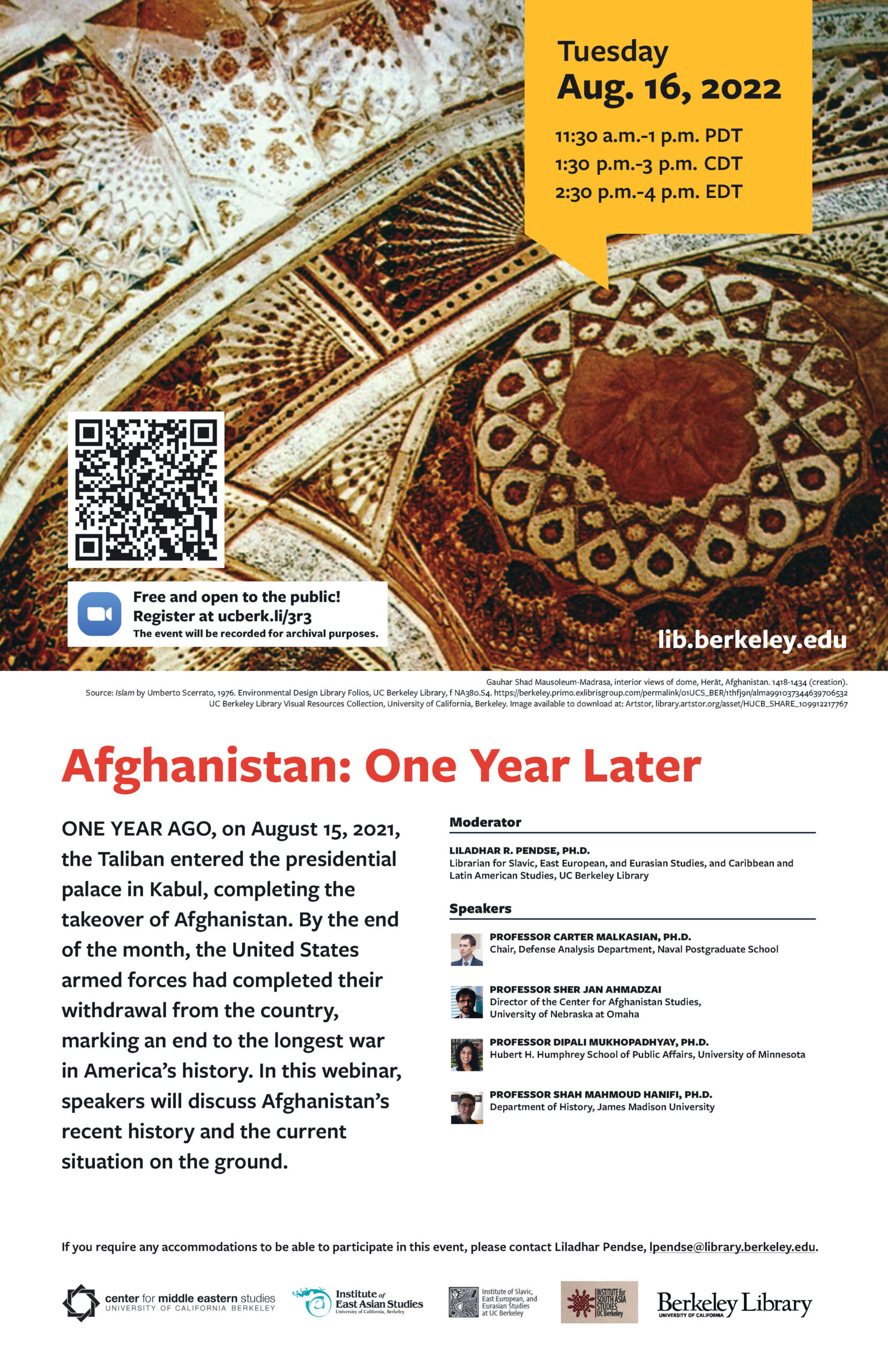
Announcing a launch of new quarterly webinar series!-Save the Date, March 18, 2021
This event is the first quarterly event in a four-part series entitled “Connecting and collecting to empower.” The series will focus on libraries and library collections from different regions of the globe to highlight the collections, print, and electronic resources from often “forgotten” or “exoticized” parts of our world. No library is an island and as curators, we are often interconnected. It is a known fact that today academic libraries can no longer serve as an archive of all that was printed from a specific region. This series is geared towards students, faculty, and researchers, and the presenters in these webinars will be faculty, academic librarians, curators, researchers, and doctoral students. Each presenter will present how the library’s collections have aided them in their academic pursuits. What were some of the challenges they had to face when they were looking for specific resources and how and if the librarians helped them overcome them?
First Webinar: The Other Asia: Central Asia and Library Collections (Spring 2021)
This 90 minutes webinar is dedicated to various library sources in Central Asia. Often, just like the Great Game in the 19th century, Central Asian Studies library collections are contested and relegated between the North American librarians for East European/ Eurasian Studies and Middle Eastern/ Near Eastern Studies. The US State Department, on the other hand, has attributed Central Asia alongside South Asia. Thus collecting Central Asian materials marks extensive collaboration among various librarians. The speakers at this webinar will speak to their efforts in collaborating to build a sustainable collection at their institutions. In this meeting, they will discuss some of the strategies they have used to develop research-level collections and collaborate with their colleagues in Central Asia. They will also focus on some open access resources.
This zoom event is free and open to all with prior registration here.
Thursday, March 18, 202111 am-12:30 PST/ 1 pm-2:30 EST
Opening Remarks: Professor David W. Roland-Holst, Agricultural and Resource Economics, UC Berkeley
Speakers:
Mr. Andy Spencer, Librarian, Middle Eastern & Central Asian Studies Librarian, University of Wisconsin-Madison
Dr. Akram Habibulla, Librarian for Middle Eastern, Islamic, and Central Eurasian Studies, Indiana University
Dr. Shah Mahmoud Hanifi, Professor of History and the founding coordinator of the Middle Eastern Communities and Migrations minor, James Madison University
Emily Laskin, Ph.D. Candidate Slavic Languages and Literatures, UC Berkeley
Organizer: Dr. Liladhar R. Pendse, UC Berkeley
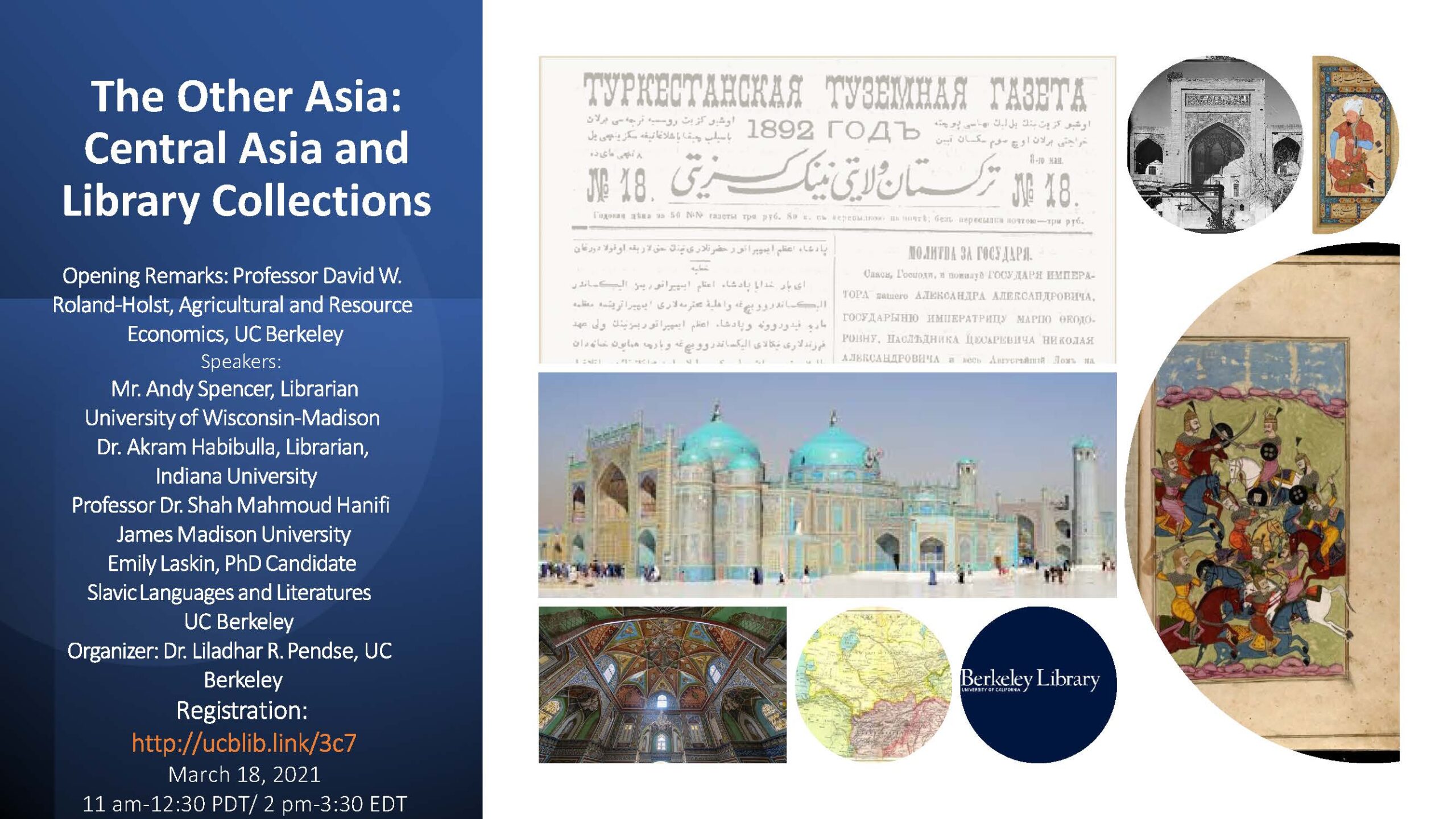
Welcome to Slavic, East European and Eurasian Studies Blog!
On the eve of “old” Russian New Year, I would like to extend a warm welcome to all who are interested in exploring with us both print and e-culture of the Slavic, East European, and Eurasian Studies collections. Often, we are questioned what Eurasia is? While there are multiple answers to the nuanced question, I will focus on Eurasian from the perspective of the often “forgotten” part of Asia- the Caucasus and Central Asia. An article on Russian culture in Luxembourg Times provides information on Russian Christmas. A brief overview of the Old and New Russian New Year is provided here.
While the New Year is here upon many in Russia, we must continue with our teaching and research under constraints imposed by the COVID-19 pandemic. I leave you to explore openly accessible books of the Institut Vostokovedeniia RAN (1818- ). The Institute of Oriental Studies of the Russian Academy of Sciences. The about section of the IV RAN‘s website provides information on the institute’s history and mission. The section of publications has basic bibliographic information on the items and provides access through the PDF. Happy Exploring!
 Below is the landing page of one of the books with PDF access.
Below is the landing page of one of the books with PDF access.
For example, if one clicks on the PDF icon as shown in the image, one can access the full-text of Istoricheskie, kulʹturnye, mezhnat︠s︡ionalʹnye, religioznye i politicheskie svi︠a︡zi Kryma so Sredizemnomorskim regionom i stranami Vostoka : IV mezhdunarodnai︠a︡ nauchnai︠a︡ konferent︠s︡ii︠a︡ (Sevastopolʹ, 6-10 okti︠a︡bri︠a︡ 2020 g.) : materialy konferent︠s︡ii, as shown below:
Until the next time, keep exploring!
Resource: Middle East and Central Asian Studies
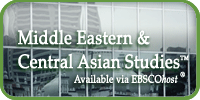 The Library has recently acquired the Middle East and Central Asian Studies database, which includes more than 740,000 records of journal and newspaper articles, books, and other research publications on the culture and politics of the Middle East, Central Asia, and North Africa.
The Library has recently acquired the Middle East and Central Asian Studies database, which includes more than 740,000 records of journal and newspaper articles, books, and other research publications on the culture and politics of the Middle East, Central Asia, and North Africa.
